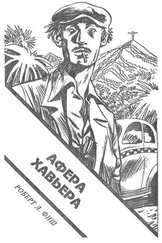He watched with a feeling of dread as Knud Christensen came tramping down the path, heavily laden with his gear. He dumped it over the rail, untied the boat, and jumped in. Krag hesitated in starting the engine, trying desperately to think of some further argument that might dissuade the other from the dive. Christensen seemed to read the other’s mind. He took partial pity on Krag.
“Jens, I’m not committing suicide,” he said quietly. “I have compressed-air equipment, not oxygen. It’s good for well below a hundred feet. I’ve worked deeper with it myself. And I’ve worked in cold water. I’ve got a wet suit and a good lamp. I’ll be all right.”
“But, Knud—”
“Get moving.” There was no longer any understanding in the big man’s voice, only implacable command. Jens Krag sighed and started the engine. The best thing to do was to get the affair over with. If Knud Christensen didn’t come up, he refused to take the slightest blame. He started the engine and headed out to sea, aware that he was probably being watched with curiosity by villagers along the shore, and possibly from the tower itself. At the approximate location he slowed and allowed the boat to drift, checking the position of the lighthouse tower and the harbor entrance, trying to picture their relative locations as they had appeared the night of the storm. The truth was he was far from sure, but would Knud Christensen accept that statement if he dove and failed to locate the Kirsten Christensen ? Undoubtedly not. The man had gone completely crazy! He sighed and became aware of Knud’s harsh voice.
“Well? This is where we held the service.” The large man had climbed into his wet suit; he was strapping on the compressed-air equipment.
“I think — I think it was about here...”
“You think ?” He glared at a subdued Krag. “You think ?”
Krag swallowed. “It was a storm, a bad one, don’t you understand?” he said helplessly. “One minute we were halfway up to the sky, the next down in a trough like a mine! We were bouncing all over. Who could try and see—?”
Knud Christensen took a deep breath and held back his temper. There was only one solution to the problem. He pulled on his flippers, picked up his lamp and walked to the railing, putting his back to it.
“Be here when I come back,” he said quietly, and put the breathing tube in his mouth. One enigmatic look at Krag’s unhappy face, and he leaned over backwards, falling into the water.
The water was cold, shocking, numbing, deadly cold, and despite his wet suit, and despite his great strength, his iron resolution, and his almost fanatical stubbornness, Knud Christensen realized he had only minutes in that icy water in which to locate his brother’s body. He sank like a plummet, brought to the bottom by the heavy weights he had attached to his belt, front and back. They would have to be jettisoned for him to rise quickly when his search was finished, but they were there to enable him to reach the bottom as rapidly as possible, and give him that much more time underwater for the job he had given himself.
The beam from his electric lamp cut weakly through the dark waters as he sank, and when at last he was on the bottom it illuminated only a small patch before him as he began a circular search, widening the arc of his path with each succeeding circuit. He had never before explored this particular section of sea bottom, but he was not surprised to find it a mass of broken rock, in sharp contrast to the chalk, sand, and marl so common elsewhere in the area. His brothers and the other fishermen had always avoided deep trawling here; a history of torn nets lay in the past experience of the older men.
Knud pushed ahead, hoping that by the very effort needed to propel himself through the freezing waters he might generate enough body heat to keep him going a few extra minutes, give him that much more time before he would be forced to abandon the search. The rocky bottom displayed only the normal detritus of an area within sight of land; discarded food tins, the remains of broken and discarded fish crates, an abandoned skiff, its torn bottom the reason for its being there. Christensen forced himself on.
The deadly cold suddenly seemed to be abating. He almost had a feeling of increasing comfort, of warmth, in fact, and he realized he was rapidly coming to the end of his endurance. Many more seconds of the satisfying torpor and he would lose all control and quickly die. One final circuit, he promised himself sleepily, and then came awake with a start, staring into the gloom. Ahead of him, looming out of the darkness, was an obvious wreck, but it was much larger than the small fishing vessel, the Kirsten Christensen . It was only as he approached it that he saw he had come upon the wreckage of two boats, locked together on the rocky bottom. He circled, seeking some identification. The nearest boat had obviously been down for many years; the other was beyond, and he swam about the first, sweeping his lights from side to side. A small case momentarily blocked his path, perched between two rocks, forming a slight barrier. He held it in the beam of his lamp as he swam about it, pushing against it to hold his turn to a minimum. The rotten wooden cover fell away, almost disintegrating, revealing a metal inner shell, rusty but apparently still solid. He swam past it, pushing himself to the other side of the combined wrecks. There, faintly seen in the dimness, was his brother Gustave. The body hung from the shrouds, seemingly relaxed, still in the still waters, as if it had come to terms with its grave beneath the sea and was waiting patiently for Armageddon.
Christensen forgot the strange metal case in an instant. He dragged his knife from his belt, somewhat surprised at the difficulty he had in commanding his fingers to obey even this simple chore. He swam over the crushed gunwale and hooked a leg about the stub of the mast, forcing himself to slash at the ropes above his head, knowing his time was rapidly running out. Still, he refused to even consider surfacing, resting, and then returning to the task. He was here and Gustave was here, and it only required a few more seconds, a little greater effort, to free the body and take it up with him.
The rope seemed to be made of steel; his knife seemed merely to be sawing at it aimlessly, helplessly, uselessly. And then it seemed to Knud as if in slow motion he could see the rope part, see the individual fibers wave slowly in the motion of the sea caused by his frantic thrashing about. Gustave seemed to hesitate a moment as if reluctant to leave the safe harbor of the shrouds, and then the body slowly began to rise. Only the most convulsive thrust of his flippers allowed Knud to catch up with Gustave before he rose out of sight in the dimness of the sea. With a curse Christensen remembered the weights at his waist. Rather than attempt to unloosen them from his belt he flipped the belt buckle, feeling the weight and his knife and all his other gear fall away; and then he was free and rising, his brother’s arm clasped as tightly as possible in his numb hand.
The boat with Jens Krag seemed far away as they broke surface. The waves washing over him seemed unnecessarily rough, and he prayed he could hold onto his senses long enough to attract Krag’s attention. He tried to call out, to shout, but his voice was a mere croak that barely carried to his own ears. At his side Gustave lolled, uninterested. For a moment Knud Christensen felt a touch of panic; not that he might die but that he might fail. Had he come this far only to freeze to death within sight of Krag’s boat? But the old fisherman had been searching the sea for him, or for his frozen and dead body, and he had seen Knud surface with his lifeless cargo. In seconds he had brought the boat to Christensen’s side and was dragging the semi-conscious man aboard. Knud tried to protest, to insist that Gustave be taken aboard first, that Gustave not be abandoned now. And then at last he lost consciousness.
Читать дальше








